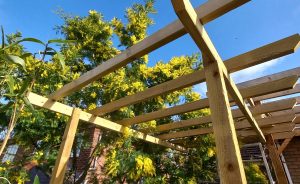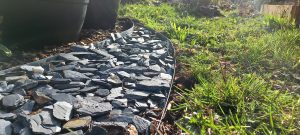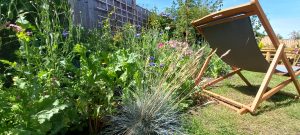Sustainability is increasingly important to gardeners. One could be forgiven for thinking that all gardens are sustainable. After all, they’re outdoors, they use natural elements and are all about nature, right?
If only.
Sadly, some materials used in gardens have a negative, if not detrimental, effect on the environment – and local wildlife. Many materials traditionally used in hard landscaping, have a massive carbon footprint, something the environmentally conscious will want to avoid.
Finding the right materials can be really tough. Sustainability can be a minefield – how do you know what the best materials with a lower carbon footprint are?
Never fear, the Genesis Gardens team are here to help point you in the right direction.
1. Avoid concrete
It’s easy to see why concrete is – or was – an attractive material for gardens. It can make an area manageable, and provide a base for containers, garden furniture or even vehicle parking.
But there’s a long list of issues with concrete.
Firstly, it creates runoff risk and erosion of all-important vegetation. Not to mention the aesthetic changes when, in the words of Joni Mitchell’s classic Big Yellow Taxi, ‘They paved paradise, put up a parking lot’.
The process of manufacturing cement (used in concrete) is extremely carbon-heavy. Indeed, in 2021, the manufacture of cement and related products was responsible for approximately 7% of global emissions.
Your garden may only be a very small area, but it all adds up – and a negative impact on the environment is something you likely want to avoid. We’d be happy to advise on more sustainable alternatives, including less-damaging cement-free concrete.
2. Use wood, but choose carefully and sustainably
 Wood is a generally much better choice.
Wood is a generally much better choice.
As long as the wood is from managed forests, it can be a great choice for your garden. Ensure you buy wood with an FSC label, meaning the supplier is part of the Forest Stewardship Council UK® programme. Alternatively, look for the PEFC mark.
In fact, wood removes carbon from the environment and acts as a carbon store. Using wood, therefore, can be carbon neutral and have a positive impact on the environment, helping combat climate change.
Just be careful about how you choose to treat or paint the wood. Avoid heat-treated or chemical-treated softwoods and instead choose durable timber. Or opt for non-toxic paint and preservatives if you wish to do the job yourself.
3. Permeable materials rock!
We’re not saying you need to avoid any kind of path or hard area. For a start, it may not be practical.
 Laying down large areas of hard paving which become unbearably hot in the summer, and create flash floods at the first sign of a heavy downpour, is not a good idea on any level.
Laying down large areas of hard paving which become unbearably hot in the summer, and create flash floods at the first sign of a heavy downpour, is not a good idea on any level.
 Instead, if you need some harder landscaped areas, then permeable and porous materials are your friend – and the environment’s friend. We’re talking a bit of gravel, with plenty of plants around to soak up excess water. Borders work brilliantly for this.
Instead, if you need some harder landscaped areas, then permeable and porous materials are your friend – and the environment’s friend. We’re talking a bit of gravel, with plenty of plants around to soak up excess water. Borders work brilliantly for this.
These tips are especially important for those front gardens, where it is so tempting to pave over the green and create car parking. If you really have to do it, then a gravel drive with borders and some planting is one of the better options.
4. Ensure wildlife has a home in your garden
We’ll cover this more in a future post about how to be environmentally friendly and sustainable in your planting and soft landscaping, but it’s worth a quick mention here too.
There are many ways to actively encourage wildlife into your garden, some of which we covered in our post: 5 easy ways to make your garden wildlife-friendly this winter.
 Whatever your garden plans, make sure you think about the wildlife. It might be including gaps in fences for hedgehogs to pass through, building insect houses, and planting bee-friendly plants. Or it might be choosing hedges over fences to provide homes and food for birds and insects.
Whatever your garden plans, make sure you think about the wildlife. It might be including gaps in fences for hedgehogs to pass through, building insect houses, and planting bee-friendly plants. Or it might be choosing hedges over fences to provide homes and food for birds and insects.
At Genesis Gardens, when we help design a garden, we consider the wider picture. All our landscaping work aims to make the space better for its users and the planet. Find out more about our philosophy and practice here.
Sustainable landscaping solutions in North Wales
Our team specialise in sustainable, creative garden design and maintenance in North Wales. We’re up to speed on all the best materials for the planet, at an affordable price.
We’re always delighted to offer a no-obligation consultation to chat through your sustainable landscaping project. Just get in touch to set something up.

